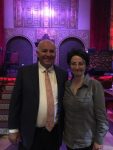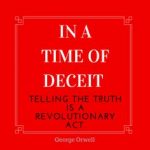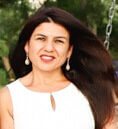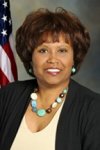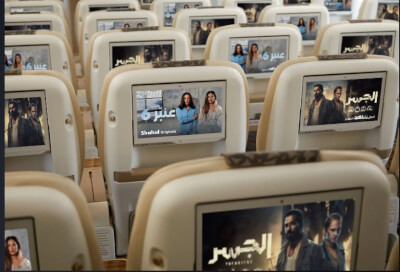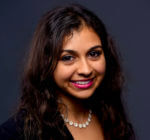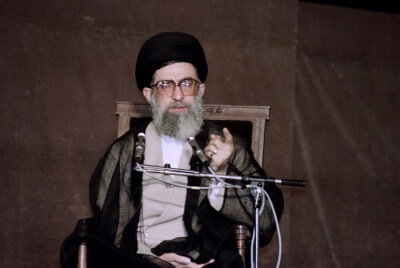Kerry appoints Shaarik Zafar Special Rep to Muslim Communities
By Ray Hanania
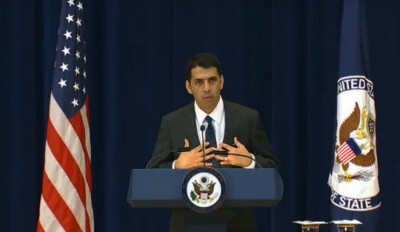
U.S. Secretary of State John Kerry Wednesday announced the appointment of Shaarik H. Zafar as the State Department’s new “Special Representative to Muslim Communities” in the United States and the international community.
The appointment was made at a closed ceremony at the Dean Acheson Auditorium at the U.S. Department of State which included State Department staffers, Zafar’s parents, and Shaun Casey, the director of the State Department’s “Special Advisor to the Secretary of State for Faith-Based and Community Initiatives” since July 15, 2013. Casey, who is on leave of absence from Wesley Theological Seminary in Washington, DC, where he is Professor of Christian Ethics and Director of the National Capital Semester for Seminarians (NCSS), opened the program and introduced Kerry who then introduced Zafar.
Kerry began the program by offering a Muslim welcome, saying “Assalamu alaikum,” the Arabic phrase for “Peace be upon you” commonly used among religious Muslims in the Muslim World and the Arab World, and then acknowledging Zafar’s parents and family who were int he audience also, including his parents Humayon and Kausar, his wife Aiysha and their two children, daughters Sophia and Aliza.
Shaarik Zafar was born in Karachi, Pakistan and moved to Katy, TX with his family at a young age. He’s been active in Muslim Outreach since his college years arguing in past public appearances that although Muslims and Arabs may have issues with American Foreign Policy, they also share the same concerns of mainstream American and “they also want to be safe on airlines, too.”
Kerry began by stating that “religion matters,” and then separated mainstream Muslims from the terrorists who claim to represent Islam, including ISIL (Islamic State of Iraq and the Levant — also ISIS, Iraq and Syria).
“When Shaarik started drafting the U.S. Strategy on Religious Leader and Faith Community Engagement, he began with two words: ‘Religion matters.’ We’re making that a mantra here at the State Department in our foreign policy, and I see it every single day. And I particularly see it in my multiple engagements in the Far East and South Central Asia, the Middle East, North Africa, and Sub-Sahara Africa,” Kerry said.
“Let me be really clear as a starting point for today’s conversation: The real face of Islam is not what we saw yesterday, when the world bore witness again to the unfathomable brutality of ISIL terrorist murderers, when we saw Steven Sotloff, an American journalist who left home in Florida in order to tell the story of brave people in the Middle East – we saw him brutally taken from us in an act of medieval savagery by a coward hiding behind a mask.”
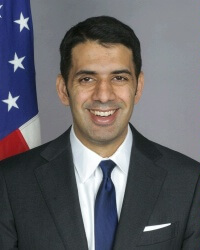
Kerry said that Sotloff’s brutal murder, videotaped in an unknown desert location by terrorists dressed in black garb to hide their identity in a cowardly fashion, was a “punch to the gut” despite military operations to save Sotloff and James Foley, who was also beheaded two weeks earlier.
“For so many who worked so long to bring Steven and other Americans home safely, this obviously was not how the story was meant to end. It’s a punch to the gut. And the United States Government, I want you to know, has used every single military, diplomatic, and intelligence tool that we have, and we always will. Our special operations forces bravely risked a military operation in order to save these lives, and we have reached out diplomatically to everyone and anyone who might be able to help. That effort continues, and our prayers remain as they always are, with the families of all of the hostages who remain trapped in Syria today,” Kerry said.
“Now barbarity, sadly, is not new to our world. Neither is evil. And I can’t think of a more graphic description of evil than what we witnessed yesterday and before that with James Foley and what we see in the unbelievably brutal mass executions of people because of their sectarian or religious affiliation. We have taken the fight to this kind of savagery and evil before, and believe me, we will take it again. We’re doing it today, and when terrorists anywhere around the world have murdered our citizens, the United States held them accountable, no matter how long it took. And those who have murdered James Foley and Steven Sotloff in Syria need to know that the United States will hold them accountable too, no matter how long it takes.”
Kerry stressed before introducing Zafar that ISIL does not represent “the face of Islam” despite their efforts to claim so.
“I want to emphasize here today, what is really important – and I want to take advantage of this podium and of this moment to underscore as powerfully as I know how that the face of Islam is not the butchers who killed Steven Sotloff. That’s ISIL. The face of Islam is not the nihilists who know only how to destroy, not to build. It’s not masked cowards whose actions are an ugly insult to the peaceful religion that they violate every single day with their barbarity and whose fundamental principles they insult with their actions,” Kerry said.
“The real face of Islam is a peaceful religion based on the dignity of all human beings. It’s one where Muslim communities are leading the fight against poverty. It’s one where Muslim communities are providing basic healthcare and emergency assistance on the front lines of some of our most devastating humanitarian crises. And it is one where Muslim communities are advocating for universal human rights and fundamental freedoms, including the most basic freedom to practice one’s faith openly and freely. America’s faith communities, including American Muslims, are sources of strength for all of us. They’re an essential part of our national fabric, and we are committed to deepening our partnerships with them.”
Kerry said his objective is to unite religious communities. He also cited several additional appointments including: Ira Forman as Special Envoy to Monitor and Combat Anti-Semitism; David Saperstein, when confirmed, will be Ambassador-at-Large for International Religious Freedom; and Shaun Casey.
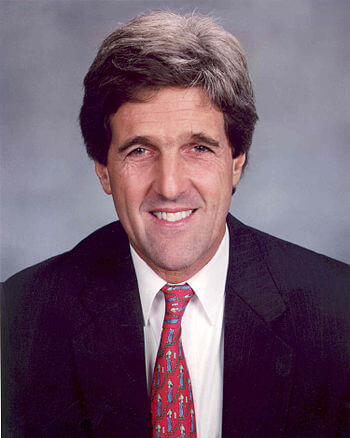
“Now people ask me why. Why now have we made this such a mission at the State Department? Why elevate our engagement at a time when world events to some people seem so hopelessly divided along sectarian lines? And the answer is really very simple: It’s a delusion to think that anyone can just retreat to their own safe space, not when people of all faiths are migrating and mingling as never before in history. The reality is that our faiths and our fates are inextricably linked. And that is profoundly why we must do this now, because they are linked,” Kerry said.
“We need to reach beyond government to include religious leaders and faith communities, entrepreneurs, civil society groups, all of them working together to invest in a future that embraces tolerance and understanding, and yes, even love.”
Zafar previously served as the Deputy Chief of the Homeland, Cyber, and Countering Violent Extremism (CVE) Group at the National Counterterrorism Center (NCTC) where he coordinated strategic planning and collaboration with Federal departments and agencies, state and local governments, allied nations, and community stakeholders on efforts to strengthen homeland and cyber security; build resilience against terrorism; and integrate all elements of national power on efforts to counter violent extremism.
Prior to that, Zafar served as Director for Global Engagement at the White House National Security Council (NSC) where he drove comprehensive engagement policies that leverage diplomacy, communications, international development and assistance, and domestic engagement in pursuit of a host of foreign and domestic policy objectives. At the NSC, Zafar led the development of the first ever national strategy that addresses violent extremism in the United States, which President Obama signed in August 2011, and the first ever national strategy on integrating religious leader engagement into U.S. foreign policy, which Secretary Kerry announced in August 2013. Prior to joining the White House, Zafar served as the Deputy Chief of the CVE Group at NCTC. He also served as a Senior Policy Advisor in the Office for Civil Rights and Civil Liberties (CRCL) at the U.S. Department of Homeland Security where he led the CRCL Engagement Team – now known as the Community Engagement Section – and provided proactive policy advice to DHS leadership on issues at the intersection of civil rights and homeland security. Before joining DHS, Zafar served as the Special Counsel for Post 9/11 National Origin Discrimination at the U.S. Department of Justice where he led the Initiative to Combat Post 9/11 Backlash. Prior to his government service, Zafar worked as a civil litigator at one of the oldest law firms in Houston, Texas.
Zafar is a graduate of the Plan II Honors Program at the University of Texas at Austin and the University of Texas School of Law. He received the 2011 Outstanding Young Texas Ex Award, which recognizes alumni under the age of 40 who have made significant achievements in their careers and service to the University. He is a recipient of the DHS Secretary’s Award for Excellence, the DHS Certificate of Achievement, and a NCTC Team Award. He has also received awards from a number of civil society organizations including the Sikh Coalition, the American-Arab Anti-Discrimination Committee, the Association of Pakistani Physicians of North America, the South Asian Chamber of Commerce, and the North American South Asian Bar Association. Shaarik is a Life Member and former Term Member of the Council on Foreign Relations.
Casey served as senior advisor for religious affairs for the 2008 Obama campaign and was National Evangelical Coordinator in the 2008 presidential campaign. His research interests include ethics and international affairs, the public implications of religious belief, and the intersection of religion and politics.
Casey has written on the ethics of the war in Iraq as well the role of religion in American presidential politics. His book, The Making of a Catholic President: Kennedy vs. Nixon 1960, was published by Oxford University Press in January 2009. He is working on two writing projects. He is co-editing the Oxford Handbook of Political Theology with Michael Kessler of Georgetown University and he is writing a book on ethics and international politics tentatively titled Niebuhr’s Children.
He is a graduate of Harvard Divinity School with a Master of Divinity Degree and a Doctor of Theology in Religion and Society. He also earned a Master of Public Administration from the Kennedy School of Government at Harvard University with a concentration in International Security. He earned a Bachelor of Arts degree from Abilene Christian University. He is a member of the American Academy of Religion and served as chair of its Committee on the Public Understanding of Religion. He was a visiting scholar at the Center for American Progress and a subject matter expert in religion at the Center for Strategic and International Studies.
Click here to LIKE the State Department’s Facebook Page for Engaging Communities of Foreign Affairs.
Click here to view the entire announcement in video format:
FULL TEXT OF KERRY’S SPEECH:
Well, Shaun, thank you very much for a warm and generous introduction. Good morning to everybody.Assalamu alaikum. Honored to be here with you this morning, and thank you so much for coming to join us on this really, frankly, exciting occasion. It’s my opportunity to be able to welcome and announce at the same time our new Special Representative for Muslim Communities, Shaarik Zafar. And – yes. applause. (Applause.) And I’m especially happy to welcome his parents – his mother, Kausar, and his father, Humayon – thank you – and his wife, Aiysha, with their lovely two children, their daughters, Sophia and Aliza. Thank you. Ladies, thank you for being here. (Applause.)
When Shaarik started drafting the U.S. Strategy on Religious Leader and Faith Community Engagement, he began with two words: “Religion matters.” We’re making that a mantra here at the State Department in our foreign policy, and I see it every single day. And I particularly see it in my multiple engagements in the Far East and South Central Asia, the Middle East, North Africa, and Sub-Sahara Africa.
Let me be really clear as a starting point for today’s conversation: The real face of Islam is not what we saw yesterday, when the world bore witness again to the unfathomable brutality of ISIL terrorist murderers, when we saw Steven Sotloff, an American journalist who left home in Florida in order to tell the story of brave people in the Middle East – we saw him brutally taken from us in an act of medieval savagery by a coward hiding behind a mask.
For so many who worked so long to bring Steven and other Americans home safely, this obviously was not how the story was meant to end. It’s a punch to the gut. And the United States Government, I want you to know, has used every single military, diplomatic, and intelligence tool that we have, and we always will. Our special operations forces bravely risked a military operation in order to save these lives, and we have reached out diplomatically to everyone and anyone who might be able to help. That effort continues, and our prayers remain as they always are, with the families of all of the hostages who remain trapped in Syria today.
Now barbarity, sadly, is not new to our world. Neither is evil. And I can’t think of a more graphic description of evil than what we witnessed yesterday and before that with James Foley and what we see in the unbelievably brutal mass executions of people because of their sectarian or religious affiliation. We have taken the fight to this kind of savagery and evil before, and believe me, we will take it again. We’re doing it today, and when terrorists anywhere around the world have murdered our citizens, the United States held them accountable, no matter how long it took. And those who have murdered James Foley and Steven Sotloff in Syria need to know that the United States will hold them accountable too, no matter how long it takes.
I want to emphasize – (applause) – but here today, what is really important – and I want to take advantage of this podium and of this moment to underscore as powerfully as I know how that the face of Islam is not the butchers who killed Steven Sotloff. That’s ISIL. (Applause.) The face of Islam is not the nihilists who know only how to destroy, not to build. It’s not masked cowards whose actions are an ugly insult to the peaceful religion that they violate every single day with their barbarity and whose fundamental principles they insult with their actions.
The real face of Islam is a peaceful religion based on the dignity of all human beings. It’s one where Muslim communities are leading the fight against poverty. It’s one where Muslim communities are providing basic healthcare and emergency assistance on the front lines of some of our most devastating humanitarian crises. And it is one where Muslim communities are advocating for universal human rights and fundamental freedoms, including the most basic freedom to practice one’s faith openly and freely. America’s faith communities, including American Muslims, are sources of strength for all of us. They’re an essential part of our national fabric, and we are committed to deepening our partnerships with them.
We’re making these efforts to unite religious communities a core mission here at the State Department. That’s what Shaarik is leading as our Special Representative to Muslim Communities. That’s what Ira Forman is leading as our Special Envoy to Monitor and Combat Anti-Semitism. And that’s what David Saperstein is leading; when confirmed, he will be our new Ambassador-at-Large for International Religious Freedom. And that’s what my friend Shaun Casey is doing in his special job in order to have a faith – interfaith office here at the State Department itself.
Now people ask me why. Why now have we made this such a mission at the State Department? Why elevate our engagement at a time when world events to some people seem so hopelessly divided along sectarian lines? And the answer is really very simple: It’s a delusion to think that anyone can just retreat to their own safe space, not when people of all faiths are migrating and mingling as never before in history. The reality is that our faiths and our fates are inextricably linked. And that is profoundly why we must do this now, because they are linked.
Our fates are inextricably linked on any number of things that we must confront and deal with in policy concepts today. Our fates are inextricably linked on the environment. For many of us, respect for God’s creation also translates into a duty to protect and sustain His first creation: Earth, the planet. Before God created man, He created Heavens and Earth. Confronting climate change is, in the long run, one of the greatest challenges that we face, and you can see this duty or responsibility laid down in scriptures, clearly, beginning in Genesis. And Muslim-majority countries are among the most vulnerable. Our response to this challenge ought to be rooted in a sense of stewardship of Earth. And for me and for many of us here today, that responsibility comes from God.
Our fates are also inextricably linked in promoting economic opportunity and justice. When you look at the world today, there are whole countries where there are 60 percent of the population under the age of 30, 50 percent under the age of 21, and 40 percent under the age of 18. We know that all of these young people in today’s interconnected globalized world, with the media that’s available to them – just look at the numbers in sub-Sahara Africa of young people walking around with smart phones. They don’t have a job, they don’t have an education, but they’re connected. And we know that all of them are as a result demanding opportunity and dignity.
We also know that a cadre of extremists – nihilists, people like ISIL – are just waiting to seduce these people into accepting the dead end. And when people don’t have a job, when they can’t get an education, when their voices are silenced by draconian laws or by violence or oppression, we’ve all witnessed the instability that follows from that, from the lack of dignity and respect for the human person. To meet the demands of these populations for dignity and opportunity, frankly, requires new and creative partnerships. That’s why Shaun is here. That’s why we’re here today. We need to reach beyond government to include religious leaders and faith communities, entrepreneurs, civil society groups, all of them working together to invest in a future that embraces tolerance and understanding, and yes, even love.
Our fates are also inextricably linked in the fight for pluralism. We know beyond any doubt that the places where people are free not just to develop an idea, but to debate different ideas, those societies are the most successful – not occasionally, but always. It’s not just a lack of jobs and opportunity that give extremists the opening that their recruitment strategies need to exploit. They’re just as content to see corruption and oligarchy and resource exploitation fill the vacuum so they can come in then and prey on the frustration and anger of those young people who were denied real opportunity.
Make no mistake: When you go back and study the major faith traditions, there is one thing that really does leap out at you. I was privileged a number of years ago to speak at an interfaith event at Yale University between a group of – a significant group – some 70 or so evangelicals from across the country, including Dr. Robert Schuller and others, and then a group of mullahs, imams, grand muftis, who had come from around the world to join together in this discussion of interfaith initiative. And I remember then, as I sort of thought about my comments and what to talk about, how it leapt out at me that there is a commonality in the Abrahamic faiths particularly, but in all faiths and in all philosophies of way of life and thinking, even Native Americanism or Confucianism and others, and that is every single one of them contains a fundamental basic notion of the Golden Rule – the importance of charity, compassion, and human improvement.
When Jesus was asked, “Teacher, which is the greatest commandment in the law,” he replied: the first “you shall love the Lord your God” and second “you shall love your neighbor as yourself…In everything, do unto others what you would have them do to you, for this is the Law and the Prophets.”
What prophets was Jesus talking about? He was talking about Moses, or Moshe, or Musa. He was talking about Abraham, or Avraham, or Ibrahim. And ultimately, he was talking about Shalom, Salam: Peace.
As the Talmud says: In Roman times, a nonbeliever approached the famous rabbi, Rabbi Hillel, and challenged him to teach the meaning of the Torah while standing on one leg. Without missing a beat, holding up one foot, Hillel replied: “What is hateful to yourself, do not do to another. That is the whole of the Torah… the rest is commentary.”
The Prophet Muhammad said of loving your brother, “Not one of you truly believes until you wish for others what you wish for yourself.”
Buddhist scriptures teach us to “treat not others in ways that you yourself would find hurtful.” And Hinduism proclaims, “This is the sum of duty: Do not do to others what would cause pain if done to you.” Our faiths teach us that we are more than the sum of our differences. We share a moral obligation to treat one another with dignity and respect. And I am so proud that at the foundation of everything that this Department and that our foreign policy tries to do are those fundamental values.
Today, we need to draw on that common faith and what must be our common hope to work for peace and put our universal commitments and universal beliefs into action. That’s the road ahead, and I am privileged to share that road with Shaarik and with all of you. Thank you.
View this video of a 2007 presentation by Shaarik Zafar as Shaarik Zafar (Senior Policy Advisor, Office for Civil Rights and Civil Liberties, Department of Homeland Security, USA) speaking on the topic of Cultural Competence and Integration of Muslim Communities:


- Israelisnipers shooting and killing hospital workers in Gaza - December 11, 2023
- CAIR Condemns Israeli Executions of Wounded, Unarmed Palestinian in West Bank - December 11, 2023
- Arab and Muslim American voters face a “simple choice” between Biden’s inhumanity and Trump’s edgy politics - December 9, 2023


















